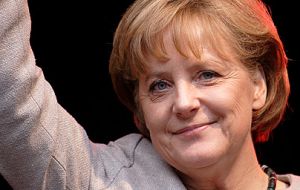MercoPress. South Atlantic News Agency
European Union remains divided over monetary aid to Greece
 German Iron Lady Angela Merkel
German Iron Lady Angela Merkel The president of the European Commission challenged German Chancellor Angela Merkel to rise above domestic politics and agree on a financial safety net for debt-stricken Greece to help preserve European monetary union.
José Manuel Barroso told a German newspaper that European Union leaders must decide at a summit on Thursday and Friday on a support mechanism for Greece or risk harm to their common currency, noting the Euro stability was in Germany's interest.
“We need a decision at this summit on how to deal with Greece, otherwise the heightened uncertainty will go on and on,” Barroso told business daily Handelsblatt.
“We can't carry on as we are, as this would threaten the stability of the Euro zone and encourage speculation,” he said. Underscoring his warning, the Euro slipped to a three-week low against the dollar as investors fretted over the uncertain prospect of support for Greece.
The risk premium on Greek debt jumped to its highest level since March 1 and the cost of insuring Greek debt against default also rose.
The 16-nation Euro zone remains divided over whether and how to provide financial help to Athens, whose struggles to cope with soaring debt and deficits have plunged the currency bloc into the deepest crisis of its 11-year existence.
Barroso's comments appeared to put him on a collision course with Merkel, who faces massive opposition at home, to any bailout ahead of a key regional election in May in which her centre-right coalition's upper house majority is at stake.
Merkel repeated on Sunday that Greece, which has imposed draconian austerity measures to cut its budget deficit, did not need money for now, something Greek Prime Minister George Papandreou confirmed in a telephone call with the German leader.
“That's why I'd urge us not to stir up turbulence in the markets by raising false expectations for Thursday's council meeting” she told Deutschlandfunk radio. “Aid will not be on the agenda at the meeting on Thursday because Greece says itself it doesn't need help right now.”
An FT/Harris poll in Monday's Financial Times showed 62% of Germans oppose their government helping Greece with its budget deficit, while only 20% are in favour.
One-third of Germans think Greece should be asked to leave the Euro while 40% believe Germany would be better off outside the currency bloc.
A plurality of Spaniards supports EU aid to Greece while opinion is evenly divided in France and Italy, whose governments have strongly advocated helping Athens, partly because they fear a market rout of Greece might ultimately turn against them.
Any financial support for Athens would likely be challenged in the German Constitutional Court, which set strict conditions barring transfers to other euro states when it approved European monetary union in the 1990s.
Given the daunting political and legal hurdles, Merkel aides have suggested Greece may have to go to the International Monetary Fund rather than the euro zone if it needs help.




Top Comments
Disclaimer & comment rulesCommenting for this story is now closed.
If you have a Facebook account, become a fan and comment on our Facebook Page!